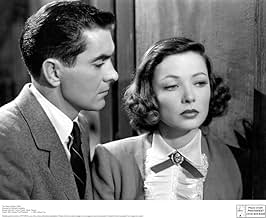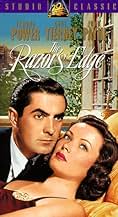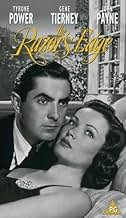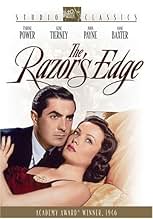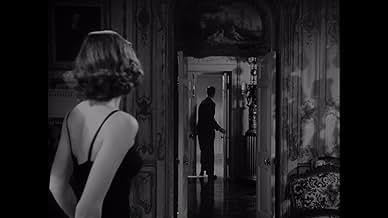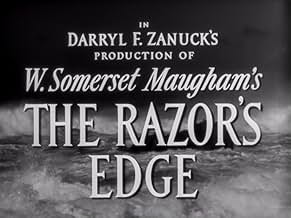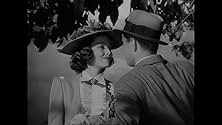VALUTAZIONE IMDb
7,3/10
7140
LA TUA VALUTAZIONE
Aggiungi una trama nella tua linguaAn adventuresome young man goes off to find himself and loses his socialite fiancée in the process. But when he returns 10 years later, she will stop at nothing to get him back, even though ... Leggi tuttoAn adventuresome young man goes off to find himself and loses his socialite fiancée in the process. But when he returns 10 years later, she will stop at nothing to get him back, even though she is already married.An adventuresome young man goes off to find himself and loses his socialite fiancée in the process. But when he returns 10 years later, she will stop at nothing to get him back, even though she is already married.
- Regia
- Sceneggiatura
- Star
- Vincitore di 1 Oscar
- 6 vittorie e 3 candidature totali
Dorothy Abbott
- Showgirl
- (non citato nei titoli originali)
George Adrian
- Party Guest
- (non citato nei titoli originali)
Demetrius Alexis
- Abbe
- (non citato nei titoli originali)
Olga Andre
- Minor Role
- (non citato nei titoli originali)
John Ardell
- Banker
- (non citato nei titoli originali)
Frank Arnold
- Miner
- (non citato nei titoli originali)
- …
Juan Arzube
- Minor Role
- (non citato nei titoli originali)
Recensioni in evidenza
Old Hollywood was always in trouble when dealing with Deep Think. That's because of the medium's commercial nature. When flirting with spiritual or religious beliefs, the studios simply didn't want to risk offending potential ticket buyers. So, when dealing with Deep Think (not their many biblical epics which were unabashedly Christian), the studios compromised to the point of absurdity by either flattening out the message or trivializing it. Here it's trivialized. After all, who's against Goodness. As a result, we wait 145-minutes to find out that, yes, Goodness is in fact a good and noble thing, and with that, Larry (Power) is on his way to enlightenment. And naturally, no one's offended, except maybe those who had expected something more.
Of course, the profundity is wrapped in lavishly mounted studio soap opera, with two of Hollywood's most beautiful people surrounded by whirling hosts of well-clothed extras. In fact, that opening ballroom scene is a marvel of orchestrated staging as the characters are introduced by serially playing off one another.
At the spectrum's other end, however, is that dreadful monastery scene with its painted mountain backdrop and facile dialog. Flattening the import of that pivotal scene are the repeated references to god as though that's where all paths must inevitably lead. And that's along with the spectacular alpine vistas fairly shouting celestial light from a heavenly above. I'm sure all that window dressing comforted nervous audiences who could then wink at Larry's spiritual quest and not feel the least bit threatened. But it also reduced a profound subject to a superficial level.
Another area that gets a Hollywood treatment are values and class, always tricky topics for an industry backed by Wall Street. The movie goes to pains circulating Larry among the gilded elite of Chicago as epitomized by the petulantly snobbish Templeton (Webb) and the selfishly insulated Isabel (Tierney). But, the elite's values are clearly materialistic, a spiritual dead-end in Larry's view as he heads off to learn from suffering with the working class. The screenplay thus sets up an implicit critique of the gilded class and the values that guide them. Well and good. But then the screenwriters can't seem to decide what to do with this point of view; after all, that's another touchy topic among audiences, especially coming so soon after the societal upheaval of the 1930's.
As a result, Larry never really criticizes the peer group he's been a part of, never really explains, that is, why he sees his social class as a spiritual dead-end, which of course would delve into a socially touchy subject. Nor, for that matter, does Larry explain why "salvation" lies through sharing a working class experience. We're left, I guess, to suppose the answer has to do with the suffering caused by hard physical labor and poor pay this class must endure. This subtext, however, is never really brought to the surface and remains unresolved at movie's end. Thus, big studio TCF and its head honcho, producer Zanuck, nibble around a second tinderbox topic, tantalizing us but never really delivering.
The movie does have a definite upside. For one, it's exquisitely well photographed, compensating somewhat for the 2-hour-plus run time. At the same time, the ballroom scenes are especially well choreographed and lavishly upholstered, creating an impressive air of wealth and breeding that makes Larry's renunciation a genuine material sacrifice. Then too, there's Webb's lively version of an unregenerate snob, a character he could do to waspish perfection. Also, Marshall's quietly observant author provides a needed contemplative note. However, in the film's pivotal role Power fails to provide the needed depth his character requires, or as another reviewer observes, Larry is pretty much the same after his trip to India as he was before. Fortunately, Power would later find that depth in Nightmare Alley (1947).
All in all, the movie remains an overlong visual treat that fortunately includes the exquisite Tierney. But as one might expect from old Hollywood, the film fails crucially at coming to grips with its two overriding themes—spirituality and class. As a result, two of life's most important questions are given unchallenging treatment. In short, here as elsewhere, where Deep Think is concerned, commercialism precedes all else.
Of course, the profundity is wrapped in lavishly mounted studio soap opera, with two of Hollywood's most beautiful people surrounded by whirling hosts of well-clothed extras. In fact, that opening ballroom scene is a marvel of orchestrated staging as the characters are introduced by serially playing off one another.
At the spectrum's other end, however, is that dreadful monastery scene with its painted mountain backdrop and facile dialog. Flattening the import of that pivotal scene are the repeated references to god as though that's where all paths must inevitably lead. And that's along with the spectacular alpine vistas fairly shouting celestial light from a heavenly above. I'm sure all that window dressing comforted nervous audiences who could then wink at Larry's spiritual quest and not feel the least bit threatened. But it also reduced a profound subject to a superficial level.
Another area that gets a Hollywood treatment are values and class, always tricky topics for an industry backed by Wall Street. The movie goes to pains circulating Larry among the gilded elite of Chicago as epitomized by the petulantly snobbish Templeton (Webb) and the selfishly insulated Isabel (Tierney). But, the elite's values are clearly materialistic, a spiritual dead-end in Larry's view as he heads off to learn from suffering with the working class. The screenplay thus sets up an implicit critique of the gilded class and the values that guide them. Well and good. But then the screenwriters can't seem to decide what to do with this point of view; after all, that's another touchy topic among audiences, especially coming so soon after the societal upheaval of the 1930's.
As a result, Larry never really criticizes the peer group he's been a part of, never really explains, that is, why he sees his social class as a spiritual dead-end, which of course would delve into a socially touchy subject. Nor, for that matter, does Larry explain why "salvation" lies through sharing a working class experience. We're left, I guess, to suppose the answer has to do with the suffering caused by hard physical labor and poor pay this class must endure. This subtext, however, is never really brought to the surface and remains unresolved at movie's end. Thus, big studio TCF and its head honcho, producer Zanuck, nibble around a second tinderbox topic, tantalizing us but never really delivering.
The movie does have a definite upside. For one, it's exquisitely well photographed, compensating somewhat for the 2-hour-plus run time. At the same time, the ballroom scenes are especially well choreographed and lavishly upholstered, creating an impressive air of wealth and breeding that makes Larry's renunciation a genuine material sacrifice. Then too, there's Webb's lively version of an unregenerate snob, a character he could do to waspish perfection. Also, Marshall's quietly observant author provides a needed contemplative note. However, in the film's pivotal role Power fails to provide the needed depth his character requires, or as another reviewer observes, Larry is pretty much the same after his trip to India as he was before. Fortunately, Power would later find that depth in Nightmare Alley (1947).
All in all, the movie remains an overlong visual treat that fortunately includes the exquisite Tierney. But as one might expect from old Hollywood, the film fails crucially at coming to grips with its two overriding themes—spirituality and class. As a result, two of life's most important questions are given unchallenging treatment. In short, here as elsewhere, where Deep Think is concerned, commercialism precedes all else.
This has got to be one of my favorite films of all. It ranks in my books up there with PLACE IN THE SUN, REAP THE WILD WIND and THE HURRICANE.
Made in the 40s by 20th Century Fox and Producer Darryl F. Zanuck, it stars Tyrone Power as Larry Farrell, a man on a journey to find the values of life. This fascinating journey takes him all over the world until he reaches a summit in India and there he meets a Holy Man, superbly played by Cecil Humphreys, who helps him understand his questions and then sends him back to the real world where he must then take his place in life. Based on the 1943 book of the same name, by W. Somerset Maugham, it does the story justice with the help of Lamar Trotti in transferring it to the screen. I read the book before seeing the film and was not disappointed. Congratulations also goes to director, Edmound Goulding for bringing the truth of the book to life.
Other noteworthy performances were delivered by the lovely Gene Tierney, as Isabel, again in Cassini dresses, and yet another co-starring Tyrone Power film; John Payne, as Gray, in a different type of role as Miss Tierney's husband, Anne Baxter, as the doomed Sophie, in her Academy Award performance, and was she excellent, Clifton Webb as Elliott Templeton, another of Webb's limp-wristed performances and another Academy Award nomination. Herbert Marshall as Maugham himself. Did anyone get the "gay" relationship between he and Templeton? Then there's Lucile Watson, Frank Gilmore and the delightful Elsa Lanchester in supporting roles. I liked Fritz Kortner as Kosti, the de-frocked priest Larry meets at a bar when he is working the mines.
Ray Dorey along with Alfred Newman wrote the theme song "Mam'selle" for the film. This is the best of the times. You can't get better. Power was superb in this. He was an underrated actor because he was such a handsome man. Yet, his abilities as an actor were terrific. He brought the intelligence of Maugham's writing to focus. Miss Baxter showed you the stuff good performers are made of with her shaded performance in this film. Also watch Marshall's reactions. His eyes are fantastic. They way his looks go from actor to actor. And look for the gay undertones between he and Clifton Webb as the eccentric uncle who delves in the upper crust life. Even to the extreme of having a coat of arms embroidered on his underwear. In the final minutes of the film Marshall speaks to Isabel after Larry leaves her for good, saying, "Goodness is, after all, the greatest force in the world . . .and he's got it." This speaks for the film and it's greatness. I think Marshall should have been nominated for his underplayed performance. He is credited with many fine roles in his career. See this classic. It's on VHS. Not to be confused with the pale remake with Bill Murray.
Made in the 40s by 20th Century Fox and Producer Darryl F. Zanuck, it stars Tyrone Power as Larry Farrell, a man on a journey to find the values of life. This fascinating journey takes him all over the world until he reaches a summit in India and there he meets a Holy Man, superbly played by Cecil Humphreys, who helps him understand his questions and then sends him back to the real world where he must then take his place in life. Based on the 1943 book of the same name, by W. Somerset Maugham, it does the story justice with the help of Lamar Trotti in transferring it to the screen. I read the book before seeing the film and was not disappointed. Congratulations also goes to director, Edmound Goulding for bringing the truth of the book to life.
Other noteworthy performances were delivered by the lovely Gene Tierney, as Isabel, again in Cassini dresses, and yet another co-starring Tyrone Power film; John Payne, as Gray, in a different type of role as Miss Tierney's husband, Anne Baxter, as the doomed Sophie, in her Academy Award performance, and was she excellent, Clifton Webb as Elliott Templeton, another of Webb's limp-wristed performances and another Academy Award nomination. Herbert Marshall as Maugham himself. Did anyone get the "gay" relationship between he and Templeton? Then there's Lucile Watson, Frank Gilmore and the delightful Elsa Lanchester in supporting roles. I liked Fritz Kortner as Kosti, the de-frocked priest Larry meets at a bar when he is working the mines.
Ray Dorey along with Alfred Newman wrote the theme song "Mam'selle" for the film. This is the best of the times. You can't get better. Power was superb in this. He was an underrated actor because he was such a handsome man. Yet, his abilities as an actor were terrific. He brought the intelligence of Maugham's writing to focus. Miss Baxter showed you the stuff good performers are made of with her shaded performance in this film. Also watch Marshall's reactions. His eyes are fantastic. They way his looks go from actor to actor. And look for the gay undertones between he and Clifton Webb as the eccentric uncle who delves in the upper crust life. Even to the extreme of having a coat of arms embroidered on his underwear. In the final minutes of the film Marshall speaks to Isabel after Larry leaves her for good, saying, "Goodness is, after all, the greatest force in the world . . .and he's got it." This speaks for the film and it's greatness. I think Marshall should have been nominated for his underplayed performance. He is credited with many fine roles in his career. See this classic. It's on VHS. Not to be confused with the pale remake with Bill Murray.
Darryl Zanuck gave in to Tyrone Power's request for some serious acting roles and not another costume part in his first post World War II film after returning from the Marines. The Razor's Edge is a bit overlong, but Tyrone Power and the rest of the cast is shown to best advantage.
The Razor's Edge is the story about a returning World War I veteran's quest for spiritual meaning in his life. Author W. Somerset Maugham wrote this during the 30s and his themes then found a good audience in 1946. He appears in the movie, played by Herbert Marshall, and it is his eyes through which we see the action unfold.
It starts at a party in the Midwest at the beginning of the Roaring 20s. All the principal characters are introduced there including Larry Darrell, played by Power, who wants to postpone his engagement to Gene Tierney. Power explains about his lack of spiritual fulfillment and his desire to do some global soul searching. Tierney's not happy, but she thinks all he wants to do is sow some wild oats and she reluctantly acquiesces.
A year later she's in Paris and she finds Ty living on the fringe and she realizes he was serious. Now Tierney is hopping mad so she marries steady and reliable John Payne. Now the plot unfolds.
As I've said in other reviews of his films Power was either the straight arrow hero or a hero/heel type. He's a straight arrow in this one as noble as you can get without crossing over into Dudley DooRightism.
Gene Tierney had essayed bitchiness in Leave Her to Heaven and she refines it to a high art here. Even though she's married to Payne, she still has a yen for Ty and her machinations are what drives the rest of the story.
John Payne, I have always been convinced was brought to 20th Century Fox as a singing Tyrone Power for musicals. So it is interesting to see them together. It is unfortunate that Payne wasn't given a better role because his part as Tierney's husband who loses his fortune in the Stock Market Crash wasn't better written. Payne proved on a lot of occasions he was a capable enough actor to handle more complex parts.
Clifton Webb plays fussy Uncle Elliott Templeton and got an Oscar Nomination, losing to Harold Russell in the Best Years of Our Lives. Webb was the closest thing for years to an out gay actor and a lot of his roles reflect that part of him, like this one. My favorite scene is after Ty Power goes to India and in that Shangri La like lamasery feels he has been made spiritually aware, with the symphonic crescendos rising, the action cuts away to a Paris tailor shop where Clifton Webb is complaining that the tassel on his robe doesn't sway, but that it bobbles.
Anne Baxter won a Best Supporting Actress Award for a playing a friend of Tierney's in the mid west. Baxter is a happy girl, marrying a young man she's deeply in love with. Her husband and baby are killed in an automobile crash. Baxter's study of physical and moral decline and degradation is some of her best work, maybe even better than Eve Harrington in All About Eve.
The story is a bit dated now, but it's still a fine film and one that shows Tyrone Power capable of far more than swashbuckling.
The Razor's Edge is the story about a returning World War I veteran's quest for spiritual meaning in his life. Author W. Somerset Maugham wrote this during the 30s and his themes then found a good audience in 1946. He appears in the movie, played by Herbert Marshall, and it is his eyes through which we see the action unfold.
It starts at a party in the Midwest at the beginning of the Roaring 20s. All the principal characters are introduced there including Larry Darrell, played by Power, who wants to postpone his engagement to Gene Tierney. Power explains about his lack of spiritual fulfillment and his desire to do some global soul searching. Tierney's not happy, but she thinks all he wants to do is sow some wild oats and she reluctantly acquiesces.
A year later she's in Paris and she finds Ty living on the fringe and she realizes he was serious. Now Tierney is hopping mad so she marries steady and reliable John Payne. Now the plot unfolds.
As I've said in other reviews of his films Power was either the straight arrow hero or a hero/heel type. He's a straight arrow in this one as noble as you can get without crossing over into Dudley DooRightism.
Gene Tierney had essayed bitchiness in Leave Her to Heaven and she refines it to a high art here. Even though she's married to Payne, she still has a yen for Ty and her machinations are what drives the rest of the story.
John Payne, I have always been convinced was brought to 20th Century Fox as a singing Tyrone Power for musicals. So it is interesting to see them together. It is unfortunate that Payne wasn't given a better role because his part as Tierney's husband who loses his fortune in the Stock Market Crash wasn't better written. Payne proved on a lot of occasions he was a capable enough actor to handle more complex parts.
Clifton Webb plays fussy Uncle Elliott Templeton and got an Oscar Nomination, losing to Harold Russell in the Best Years of Our Lives. Webb was the closest thing for years to an out gay actor and a lot of his roles reflect that part of him, like this one. My favorite scene is after Ty Power goes to India and in that Shangri La like lamasery feels he has been made spiritually aware, with the symphonic crescendos rising, the action cuts away to a Paris tailor shop where Clifton Webb is complaining that the tassel on his robe doesn't sway, but that it bobbles.
Anne Baxter won a Best Supporting Actress Award for a playing a friend of Tierney's in the mid west. Baxter is a happy girl, marrying a young man she's deeply in love with. Her husband and baby are killed in an automobile crash. Baxter's study of physical and moral decline and degradation is some of her best work, maybe even better than Eve Harrington in All About Eve.
The story is a bit dated now, but it's still a fine film and one that shows Tyrone Power capable of far more than swashbuckling.
I discovered this movie only recently and have watched it three times in the last two months. It's the kind of movie that rewards repeated viewings. The story, as others have commented, is moving and inspiring and way ahead of its time, dealing as it does with topics (the philosophical/spiritual quest for meaning in life, alcoholism, psychic healing, class divisions, post-war trauma, greed vs. self sacrifice) that one would expect in a movie taking place in the nineteen sixties rather than one taking place immediately following World War I. It offers the pleasure of Hollywood glamour of a very high order with one spectacular set-piece after another. Over and over, one is amazed at the staging of scenes set at balls, restaurants, night-clubs, Paris streets, factories, etc. Many jaw-dropping, pre-steadycam long takes involve the choreography of dozens of elements, e.g. one long take outside a Paris railway station, or another crane shot in a Paris night club as the camera searches the crowd for the protagonists. Everyone involved with the film seems to be working at his or her peak, from director Goulding to composer Alfred Newman, to all the perfectly cast actors. The screenplay is filled with brilliant cinematic story-telling devices (ironic voice-overs, montage sequences, foreshadowings, symbolism (the use of water and the ocean in so many scenes)that keep a long and complex story moving so smoothly that the two-hour-plus running time is hardly noticed at all. The cinematography by someone named Arthur Miller is gorgeous with lighting effects and moving camerawork that rank in the pantheon of Hollywood's visual creations. This is a great film.
British storyteller W(illiam) Somerset Maugham's 1944 speculative novel "The Razor's Edge," as did his earlier semi-autobiographical "Of Human Bondage," won a devoted following when it hit the book shelves, and so 20th Century-Fox wasted no time in securing the screen rights to this mammoth war-era adventure into existentialism. It was a difficult, elephantine undertaking but they somehow managed to carve out a screenplay and present the whole package within two years of the novel's first print.
Awesomely produced and directed, the resulting movie, for the most part, propels Maugham's central theme -- that there is good and bad in all human beings. The focus centers in on the long, spiritual quest of Larry Durrell, a basically virtuous individual who, surrounded by wealth, beauty and privilege, abandons his enviable but superficial trappings to pursue a more humble, meaningful life. Oddly enough, it's the superficial elements of the story and the more pretentious characters that hold up "The Razor's Edge," while the spiritual scenes grow flat and weary, often times stopping the action dead in its tracks.
In casting Tyrone Power as the protagonist, one finds THE major flaw in its presentation. Tagged as a pretty boy for most of his career, he managed to show only glimpses of dramatic aptitude from time to time ("Witness for the Prosecution" comes to mind). Earnest and utterly sincere in his approach, Power simply lacks the power (sorry) and the depth to carry off this complex, confused, anachronistic soul-searcher. His Durrell seems better suited amongst the shallow and superficial. One only wonders what a Robert Donat or Fredric March might have done with such a role.
Surrounding Power, however, is a stellar list of names that gussies up this production, and it is in them that we find the film's emotional impact. In particular, Gene Tierney offers one of her finest performances as Isabel, the grasping, captivating socialite obsessed with Durrell, who shows her true colors in the end when goodness and all else fails to win her the love of a man. Like Power, Tierney is a flawless, incredibly photogenic beauty who tended toward posturing instead of acting. Here she is allowed to capitalize on her tendency towards elegant frippery, offering a cool, intriguing portrait of a woman who can and will never have enough.
We are also blessed with the presence of Clifton Webb, the epitome of smug elegance, who is true to form here as the meticulous, wasp-tongued prig who is not use to being told "no." As in the classic "Laura," Webb is handed the film's most delicious lines as his character goes about buffering his unhappiness with scorn and witty sarcasm. He would warm over this character recipe many times in movies, but darned if you don't keep going back for second helpings. He is delightfully hateful and absolutely mesmerizing. Anne Baxter as the helpless, tragic Sophie is heart-wrenching, giving a florid, Oscar-winning performance that lingers long after the final reel. She, not Power, is the heart and ravaged soul of this piece. The hospital scene following her horrific accident will rip you apart, as will her subsequent degradation into alcohol and prostitution. Known for her flashy, theatrical roles, Baxter plays Sophie for all its worth.
John Payne is typically upright and appealing and does what he can in a rather stiff, thankless "other man" part, while suave Herbert Marshall, who, in reality, lost a leg in WWI but continued to act (often in a chair), portrays Maugham himself with customary flair.
Granted, "The Razor's Edge" is no "Lost Horizon" in the metaphysical department, but on its own it is quite admirable and engrossing entertainment. It manages to hold up exceedingly well under its great length and weight, feels only slightly dated, and prides itself with gorgeous production values and a handsome, handsome cast.
Awesomely produced and directed, the resulting movie, for the most part, propels Maugham's central theme -- that there is good and bad in all human beings. The focus centers in on the long, spiritual quest of Larry Durrell, a basically virtuous individual who, surrounded by wealth, beauty and privilege, abandons his enviable but superficial trappings to pursue a more humble, meaningful life. Oddly enough, it's the superficial elements of the story and the more pretentious characters that hold up "The Razor's Edge," while the spiritual scenes grow flat and weary, often times stopping the action dead in its tracks.
In casting Tyrone Power as the protagonist, one finds THE major flaw in its presentation. Tagged as a pretty boy for most of his career, he managed to show only glimpses of dramatic aptitude from time to time ("Witness for the Prosecution" comes to mind). Earnest and utterly sincere in his approach, Power simply lacks the power (sorry) and the depth to carry off this complex, confused, anachronistic soul-searcher. His Durrell seems better suited amongst the shallow and superficial. One only wonders what a Robert Donat or Fredric March might have done with such a role.
Surrounding Power, however, is a stellar list of names that gussies up this production, and it is in them that we find the film's emotional impact. In particular, Gene Tierney offers one of her finest performances as Isabel, the grasping, captivating socialite obsessed with Durrell, who shows her true colors in the end when goodness and all else fails to win her the love of a man. Like Power, Tierney is a flawless, incredibly photogenic beauty who tended toward posturing instead of acting. Here she is allowed to capitalize on her tendency towards elegant frippery, offering a cool, intriguing portrait of a woman who can and will never have enough.
We are also blessed with the presence of Clifton Webb, the epitome of smug elegance, who is true to form here as the meticulous, wasp-tongued prig who is not use to being told "no." As in the classic "Laura," Webb is handed the film's most delicious lines as his character goes about buffering his unhappiness with scorn and witty sarcasm. He would warm over this character recipe many times in movies, but darned if you don't keep going back for second helpings. He is delightfully hateful and absolutely mesmerizing. Anne Baxter as the helpless, tragic Sophie is heart-wrenching, giving a florid, Oscar-winning performance that lingers long after the final reel. She, not Power, is the heart and ravaged soul of this piece. The hospital scene following her horrific accident will rip you apart, as will her subsequent degradation into alcohol and prostitution. Known for her flashy, theatrical roles, Baxter plays Sophie for all its worth.
John Payne is typically upright and appealing and does what he can in a rather stiff, thankless "other man" part, while suave Herbert Marshall, who, in reality, lost a leg in WWI but continued to act (often in a chair), portrays Maugham himself with customary flair.
Granted, "The Razor's Edge" is no "Lost Horizon" in the metaphysical department, but on its own it is quite admirable and engrossing entertainment. It manages to hold up exceedingly well under its great length and weight, feels only slightly dated, and prides itself with gorgeous production values and a handsome, handsome cast.
Lo sapevi?
- QuizThere were 89 different sets built for the film, which had the longest shooting schedule for any film at the studio to that date. According to some news items, the film broke all previous studio box office records.
- BlooperAfter a promising beginning, in which the clothes and hairstyles of 1919 are pleasantly and reasonably accurately interpreted, as soon as it gets to 1920, then on to 1930, and beyond, Gene Tierney's hairstyle is in an unchanging, although very attractive, 1946 mode, and all of her clothes, designed by husband Oleg Cassini, except for lower hemlines, are strictly 1946, complete with the ubiquitous shoulder pads of that era. Anne Baxter's ensembles look more like Tierney/Cassini rejects, an unhappy compromise between opposing styles.
- Curiosità sui creditiWhen the screenplay credits are shown, a curious symbol appears near W. Somerset Maugham's name. It's a symbol meant to ward off the evil eye, and it more often than not appeared on the covers of many of Maugham's novels.
- ConnessioniFeatured in 20th Century-Fox: The First 50 Years (1997)
I più visti
Accedi per valutare e creare un elenco di titoli salvati per ottenere consigli personalizzati
- How long is The Razor's Edge?Powered by Alexa
Dettagli
- Data di uscita
- Paese di origine
- Lingue
- Celebre anche come
- El filo de la navaja
- Luoghi delle riprese
- Denver, Colorado, Stati Uniti(2nd unit exteriors, backgrounds, mountains)
- Azienda produttrice
- Vedi altri crediti dell’azienda su IMDbPro
Botteghino
- Budget
- 1.200.000 USD (previsto)
- Tempo di esecuzione2 ore 25 minuti
- Colore
- Proporzioni
- 1.33 : 1
Contribuisci a questa pagina
Suggerisci una modifica o aggiungi i contenuti mancanti


